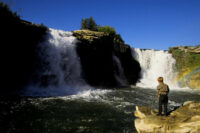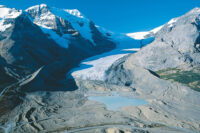Is mining in headwaters worth the risk?
By Submitted Article on August 15, 2020.
Submitted by the Southern Alberta Group for the Environment
For the first time in four decades, headwaters of the Oldman River are again under threat from open-pit coal mining. Expansive scars of coal mines on Tent Mountain south of Coleman and Grassy Mountain mine north of Blairmore, projects that fizzled out by 1980, remain stark reminders of companies that left without cleaning up their mess.
The Alberta Coal Policy adopted by the Lougheed government in 1976 restricted coal exploration and development along the eastern slopes of Alberta’s Rocky Mountains due to “marginal economic benefits” and “important environmental values, such as wildlife migration and headwaters areas.” With the rescinding of that policy by the current government, coal companies are back proposing to reopen and expand surface mining on Tent Mountain and Grassy Mountain and explore large areas of mountainous country west of the Livingstone Range north to the Highwood River.
Coal mining, particularly surface mining in mountains, is one of the most brutal assaults by humans on the Earth. The changes in natural landscapes and headwaters ecosystems are profound. Vegetation and soils that have evolved over millennia are stripped to reveal ancient bedrock. Using explosives and some of the largest machines on Earth, mountaintops are shattered and removed to expose coal seams. “Overburden” is dumped into adjacent valleys. Roads are carved into the diminishing mountain sides to haul extracted coal away in giant trucks to valley bottom processing plants. Water falling as rain and snow that was naturally absorbed by vegetation and soil rushes unchecked and unfiltered to valley-bottom streams that become seriously disrupted by altered flows and contaminants. Resident fish and wildlife are destroyed or displaced for untold generations.
Songwriter John Prine captured the profound sense of destruction and loss that is wrought by mountaintop coal mining in his song “Paradise” – “Mr. Peabody’s coal train has hauled it away.” To witness the loss of a mountain paradise by coal mining, southern Albertans don’t need to travel all the way to Muhlenberg County, Kentucky but rather can peer across the continental divide into the Elk River and its tributary valleys (including Fording River) in British Columbia. Five massive open-pit coal projects, operated by Teck Resources, have flattened mountains and filled valleys with piles of rubble. Biodiversity has been significantly impacted, including habitats for whitebark pine, Westslope cutthroat trout, grizzly bear and bighorn sheep.
A more insidious impact is the selenium that leaches from the previously buried rock now exposed to air and water. Naturally occurring in soils and plants, selenium is an essential trace element in healthy diets of animals and humans. However, at high concentrations selenium can cause neurological disorders in humans, liver damage and paralysis in other animals, and birth defects and reproductive failure in fish. Waterborne selenium can enter the food chain where it bioaccumulates. Toxic effects of selenium on aquatic life, fish and birds have been documented in the mountaintop coal-mining regions of the Appalachians and more recently the Elk Valley of B.C., extending up to 200 kilometres downstream in Montana. Sparwood’s drinking water supply has become contaminated.
Residents of the Oldman River Basin rely on plentiful, clean water flowing from the eastern slopes of the Rocky Mountains for survival and economic well-being including food production. Southern Albertans value our headwaters region for its scenic natural landscapes, wildlife and unsurpassed outdoor recreation and tourism opportunities. Experience elsewhere confirms that mountaintop coal mining places all that at risk. Albertans in the 1970s, based on experience, decided it was not worth the risk. Why does today’s government think it is?
9-8




